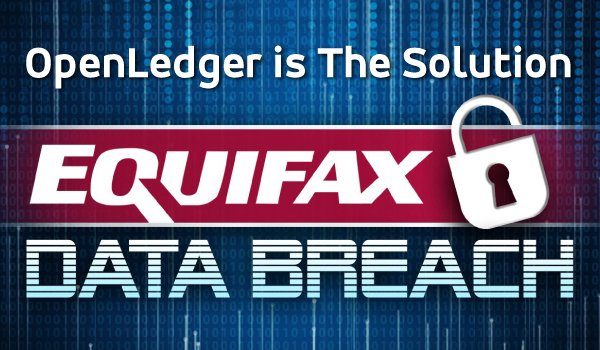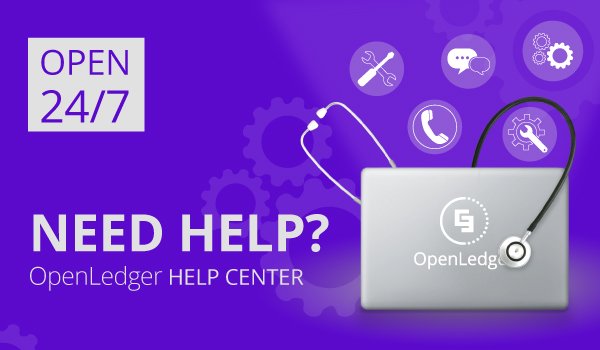What happened with Equifax in the USA and how OpenLedger BaaS Would have been the Solution

Equifax, one of the nation’s three main credit reporting agencies (the other two are Experian and TransUnion), announced on September 7 a cybersecurity incident that potentially impacted approximately 143 million U.S. consumers. The cybersecurity firm Mandiant completed the forensic portion of its investigation on the incident by the beginning of October and announced that approximately 2.5 million additional U.S. consumers were potentially impacted, raising the total number to 145.5 million, which is over 40% of the U.S. population.
Based on the company’s investigation, the unauthorized access occurred from mid-May through July 2017. The information accessed primarily includes names, Social Security numbers, birth dates, addresses and, in some instances, driver’s license numbers. In addition, credit card numbers for approximately 209,000 U.S. consumers, and certain dispute documents with personal identifying information for approximately 182,000 U.S. consumers, were accessed. As part of its investigation of this application vulnerability, Equifax also identified unauthorized access to limited personal information for certain UK and Canadian residents.[1]
Criminals exploited the U.S. based website application vulnerability to gain access to certain files. Although the company has found no evidence of unauthorized activity on Equifax’s core consumer or commercial credit reporting databases yet, the threat isn’t necessarily immediate: criminals have the information they need and they can decide to use it whenever they want.
The Equifax hack serves as a prime example of how centralized databases and servers create massive vulnerabilities for consumers. One single company’s system exposed sensitive information potentially compromising the identity of nearly half the country.
Several specialists have now been suggesting that using blockchain technology would have kept consumers’ data completely safe.
Jason Bloomberg — who has dubbed himself “a skeptic — primarily around Bitcoin, but for blockchain as well” — writes in Forbes[2] that an open sourced distributed ledger would solve the problem fast. In addition, a decentralized platform would give the extra safety and security that Equifax was lacking, and companies like OpenLedger who provide blockchain solutions (BaaS) have been advising global businesses how to stop this from happening to them.
Ronny Boesing, CEO of OpenLedger, says that “Building the solutions to these problems using blockchain technology allows more than safety and security. There are so many more plusses including transaction speeds and transparency that make a decentralized solution the only solution going forward for every company.”
“The whole SSN as identifier regime needs to be scrapped,” says Eduard Goodman, global privacy officer at the identity theft protection firm CyberScout. “As we see more and more issues with the centralization of data, different schemes for different uses — biometrics for in-person interactions/transactions, some form of advanced encryption or blockchain technologies online. The solutions are already in front of our eyes.”[3]
Blockchain proponents advocate that consumers can limit the amount of personal information used to authenticate themselves when using blockchain technology. According to Jerry Cuomo, vice president of Blockchain Technologies at IBM, consumers will have sovereign authority over their personal information when operating on blockchain since transactions are securely verified by permissioned participants. Bypassing centralized servers and databases will spread consumer information across secured peer-to- peer networks protected by layers of cryptography. Incidents like the Equifax hack lend credence to the benefits of blockchain in enhancing cybersecurity.[4]
Boesing added, “The funny thing is that right after one of these incidents, our enquiries for BaaS go up 60%. Why companies do not do this now instead of waiting for themselves to be the next target, I do not know.”
[1] https://www.equifaxsecurity2017.com
[3] https://www.wired.com/story/the-equifax-breach-exposes-americas-identity-crisis/
[4] https://www.freightwaves.com/news/2017/9/12/lessons-learned-from-equifax

Created on September 19th, 2017, the members of OpenLedger’s Chinese telegram group reached 1000, with the speed of growth impressing the crypto and blockchain communities.
The OpenLedger telegram group that aims to provide better support and information for Chinese speakers, becoming the first choice for them to directly get connected with OpenLedger. In this group, everyone is free to talk about everything related to blockchain, crypto-currency, OpenLedger and Bitshares – in a respectful manner.
Community Manager, Zhaomu Liao, says, “People here are friendly and always willing to teach the newcomers how to use the OpenLedger DEX. For Chinese users have questions regarding deposits or withdrawals from OpenLedger’s Decentralized Exchange, this group can lead them to OpenLedger’s help desk and provide further assistance.
A senior members from the Bitshares community said, “OpenLedger are building a Chinese Bitshares empire on social media. This is ‘Crazy’ growth, 0 to 1000 members, in weeks!”
Ronny Boesing, the CEO of OpenLedger, responds to questions towards him in a timely manner. Boesing says, “If you don’t know a single word of English, don’t worry! You can find Zhaomu online and just enjoy your time discussing the future of OpenLedger with everyone, including me.”
“My team and I have been to China frequently this year as we have many businesses we are doing business with and we believe that China has a huge potential market for blockchain business. Our vision is to expand our BaaS (Blockchain as a Service) and use blockchain technology to futureproof businesses successfully.”
Boesing continued, “When someone in the Telegram group asked me whether China’s announcement about ICOs would affect OpenLedger’s plans, I replied, ‘No. OpenLedger always focuses on finding the real use cases of blockchain and making people’s life better by using this technology.’ We are building a healthy and self-growing ecosystem, which means it is stable and reliable. BaaS is really the future”
Aviva Ounap, CMO of OpenLedger, says, “It is known that this official telegram group is just a small but significant slice of OpenLedger’s targeted marketing plan for the Chinese market. In order to coordinate with the launch of OpenLedger’s new website, a new, official WeChat account was registered, which will post the latest information about OpenLedger and the projects currently operating and launching in its ecosystem. In addition, Chinese translation for the new website is already in progress. Our communities are genuinely happy about our growth and progress, and we look forward to welcoming even more to our world.”

OpenLedger Decentralized Exchange (DEX) released two new tokens to the market. The new tokens: EOS and OMG.
[
Follow OpenLedger on socials



